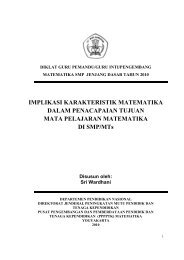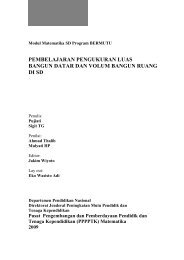25 Biggest Mistakes Teachers Make and How to Avoid Them
25 Biggest Mistakes Teachers Make and How to Avoid Them
25 Biggest Mistakes Teachers Make and How to Avoid Them
Create successful ePaper yourself
Turn your PDF publications into a flip-book with our unique Google optimized e-Paper software.
136 Personality <strong>and</strong> Professionalism<br />
The new green twig on the<br />
branch of a tree is full of life,<br />
supple <strong>and</strong> yielding as it bends <strong>to</strong><br />
withst<strong>and</strong> the winds of change. In<br />
contrast, the dead, dry twig is hard,<br />
unyielding, unbending, often cracking<br />
under the forces of change <strong>and</strong><br />
nonconformity. In many ways, the<br />
teacher in this scenario is like the<br />
dead, dry twig. He is hard <strong>and</strong> calloused<br />
in his attempt <strong>to</strong> punish a sick<br />
child. When the sick student breaks<br />
the rules by abruptly attempting <strong>to</strong><br />
leave the classroom, the teacher<br />
turns a deaf ear <strong>to</strong> the student’s<br />
explanation. The teacher finally<br />
cracks <strong>and</strong> starts yelling <strong>and</strong> chasing<br />
the student. His cracked, irrational<br />
behavior shatters the peace of the<br />
classroom. His punitive action has<br />
SCENARIO 16.8<br />
The Bereaved Must Leave<br />
embarrassed the student, created an<br />
inaccurate attendance record that<br />
could cost the school some dollars,<br />
<strong>and</strong> encouraged truancy.<br />
Like the green twig, reasonable<br />
teachers easily bend <strong>and</strong> sway with<br />
change. If there is a change in routine<br />
or a disruption in class because<br />
a student is ill, these teachers skillfully<br />
h<strong>and</strong>le the emergency without<br />
losing momentum. They would keep<br />
the disruption <strong>to</strong> a minimum by giving<br />
some gesture of approval <strong>to</strong><br />
assure the student that leaving is<br />
permissible. Caring teachers would<br />
follow up <strong>to</strong> make sure the student<br />
was feeling better or <strong>to</strong> provide further<br />
assistance. They are flexible<br />
<strong>and</strong> willing <strong>to</strong> relax the rules in<br />
times of crisis.<br />
When I was in fourth grade, my gr<strong>and</strong>mother had just passed away. Since we were very<br />
close, that was a difficult time for me. I would cry in class sometimes when I began <strong>to</strong><br />
think about her. One day I was crying, <strong>and</strong> Ms. H. sent me out in<strong>to</strong> the hall.<br />
Bereavement is a state of loss<br />
of a loved one. Grief is the<br />
overwhelming feeling of anguish or<br />
sorrow that accompanies bereavement.<br />
Crying is a natural expression<br />
of that grief. Children <strong>and</strong> adults cry<br />
over the loss of loved ones. Crying<br />
is therapeutic for some people. If<br />
crying is so natural, healthy, <strong>and</strong><br />
therapeutic, why is the teacher so<br />
bothered by it? The teacher’s discomfort<br />
with the child’s display of grief<br />
may be attributed <strong>to</strong> the conventions<br />
of our society. A public display of<br />
grief, outside of funerals, is viewed<br />
as disconcerting <strong>and</strong> sometimes<br />
inappropriate. As a society we are<br />
uncomfortable with tears. We are<br />
quick <strong>to</strong> offer a tissue <strong>to</strong> sop them<br />
<strong>and</strong> s<strong>to</strong>p them. Sending the child <strong>to</strong><br />
the hall for crying was an insensitive<br />
act that may give a child the impression<br />
that she had done something<br />
wrong.<br />
Compassionate teachers are <strong>to</strong>lerant<br />
of tears. If a child is crying,<br />
these teachers feel compelled <strong>to</strong><br />
investigate the cause of the crying<br />
<strong>and</strong> <strong>to</strong> offer comfort if necessary.<br />
Gelman (1983) contends that people<br />
should be allowed <strong>to</strong> work through<br />
their grief. Underst<strong>and</strong>ably, teachers





